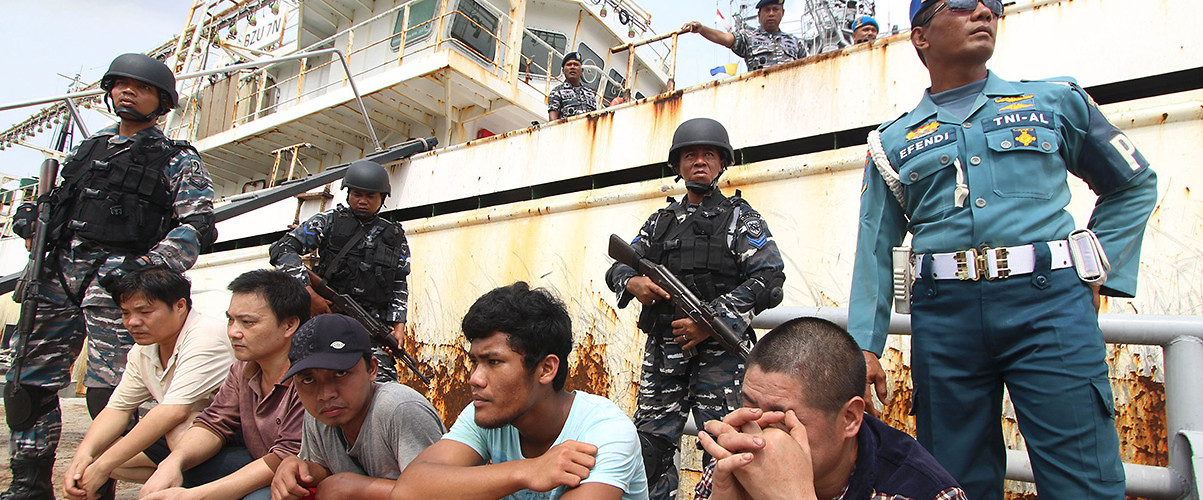Members of the Indonesian Navy holding crew members of a Chinese trawler intercepted in Indonesian waters. Belawan, North Sumatra, April 23, 2016. (Abimata Hasibuan/AFP/Getty Images)
A recent clash with China over fishing rights has complicated Indonesia’s long-standing and ambiguous position of neutrality regarding territorial and maritime disputes in the South China Sea. The Chinese Coast Guard’s March 19th rescue of a Chinese fishing boat being apprehended by Indonesian authorities near the Natuna Islands set off a public and government uproar and a debate on the future of sovereignty claims in the region.
Notwithstanding Beijing’s admission of Indonesian ownership of the actual islands in question, the incident caused Jakarta to acknowledge that its claims of rights over surrounding waters are contested by Beijing’s nine-dash line. The line claims most of the South China Sea for China and is the foundation for its many disputes with other countries in the region.
Until now, Jakarta has officially maintained that it does not recognize the nine-dash line, is not a party to South China Sea disputes, and can therefore offer its services as a third-party mediator for other countries clashing with China. Indonesia initiated a dialogue on these issues through a series of informal workshops during the early 1990s. This resulted in the Association of Southeast Asian Nations (ASEAN)-led dialogue on the South China Sea and paved the way for the signing of ASEAN’s Declaration of the Code of Conduct in the South China Sea in 2002.
These positions are now facing increasing political and popular scrutiny. Should Jakarta officially change its position, it will likely also weaken ASEAN’s dialogue and dispute settlement processes. It will also produce a greater military build-up from the Indonesian side, as has already been seen with the decision to deploy F-16 fighter jets to the region. From China’s point of view, it adds another member to the rival camp, which could have been avoided with a more cautious approach.
Indonesian strategic expert and current Ambassador to the United Kingdom, Rizal Sukma, looked to defuse the clash, cautioning that it should be considered as merely a “fishing incident.” Popular Indonesian Minister for Maritime Affairs and Fisheries, Susi Pudjiastuti, ignored this nuance, however, and gave in to populist politics. In threatening to take China to the International Tribunal for the Law of the Seas, she effectively made it a sovereignty dispute involving issues around the nine-dash line and Indonesia’s rights to its exclusive economic zone around its territories. Indonesia’s Foreign Ministry confirmed as much in challenging the legality of what the Chinese embassy referred to as a “traditional Chinese fishing ground.” The ministry instead termed the Chinese behavior a “violation of Indonesia’s sovereign rights.”
Indonesia’s well-crafted ambiguity and position of neutrality in the South China Sea has increasingly come under scrutiny from the nation’s strategic community. It has been called “incoherent,” exhibiting an “over-reliance on the non-claimant honest broker position,” and attributed to “institutionalist thinking” carried over from the era of longtime leader Suharto. Various military officials have also periodically acknowledged the existence of a Sino-Indonesian sovereignty dispute, in direct contravention of the Foreign Ministry’s previous positions. These attacks are now gradually seeping into popular debates.
Both external and domestic factors have been testing official patience with long-held policies. First, the scale and frequency of Sino-Indonesian maritime tensions has steadily escalated. In contrast to an indirect threat by Chinese Coast Guard vessels during a March 2013 altercation, the incident last month involved a direct encounter and the use of force by Chinese authorities. Beijing’s militaristic posture and the increasing incidence of such encounters has pushed many other littoral countries of the South China Sea to take up more assertive and nationalistic positions on their disputes with Beijing, and Indonesia is now following suit.
Second, the government of Joko Widodo has projected a notion of Indonesia as a global maritime power in the Indo-Pacific region, which has increased the focus on safeguarding its maritime space and resources. The country’s politically, economically, and strategically popular “sink and burn” campaign against illegal fishing has upped the ante in this respect. It has exposed Indonesia’s neutrality to hyper-sensitive popular scrutiny and nationalist rhetoric. In this climate, the maintenance of ambiguity or any climb-down may be seen as an expression of weak leadership. An emerging, demographically young Indonesia is calling for a more capable and assertive maritime strategy based on the development and deployment of military capability.
Finally, the last 18 months have seen the gradual weakening of Indonesia’s Foreign Ministry, with its prerogatives and responsibilities being taken over by other offices. This includes Widodo’s decision in 2015 to allocate responsibilities of economic engagement with other countries to various other ministries. These other ministries have been less restrained in making statements on Indonesia’s South China Sea position. The Minister for Political, Legal and Security Affairs, Luhut Pandjaitan, declared in November 2015 that Indonesia would take China to international court over the issue. This was backed up by Minister Pudjiastuti’s recent threats on involving the International Tribunal for the Law of the Seas. In the past, only the military may have felt bold enough to make such statements.
As South China Sea disputes escalate and Indonesia’s emerging maritime power narrative gains more prominence, Jakarta may encounter increasing political pressure to assert its sovereignty and succumb to the domestic objection to its less popular, albeit more nuanced, position of neutrality and non-claimant status. This would push leaders towards consolidating Indonesia’s maritime defense and abandoning its regional mediation role.
Vibhanshu Shekhar is Scholar in Residence at the ASEAN Studies Center, School of International Service, American University, Washington DC.





